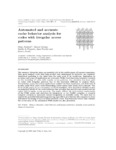Mostrar o rexistro simple do ítem
Automated and accurate cache behavior analysis for codes with irregular access patterns
| dc.contributor.author | Andrade, Diego | |
| dc.contributor.author | Arenaz Silva, Manuel | |
| dc.contributor.author | Fraguela, Basilio B. | |
| dc.contributor.author | Touriño, Juan | |
| dc.contributor.author | Doallo, Ramón | |
| dc.date.accessioned | 2019-02-08T16:29:43Z | |
| dc.date.available | 2019-02-08T16:29:43Z | |
| dc.date.issued | 2007-04-03 | |
| dc.identifier.citation | Andrade, D. , Arenaz, M. , Fraguela, B. B., Touriño, J. and Doallo, R. (2007), Automated and accurate cache behavior analysis for codes with irregular access patterns. Concurrency Computat.: Pract. Exper., 19: 2407-2423. doi:10.1002/cpe.1173 | es_ES |
| dc.identifier.issn | 1532-0626 | |
| dc.identifier.issn | 1532-0634 | |
| dc.identifier.uri | http://hdl.handle.net/2183/21698 | |
| dc.description | This is the peer reviewed version of the following article: Andrade, D. , Arenaz, M. , Fraguela, B. B., Touriño, J. and Doallo, R. (2007), Automated and accurate cache behavior analysis for codes with irregular access patterns. Concurrency Computat.: Pract. Exper., 19: 2407-2423. doi:10.1002/cpe.1173, which has been published in final form at https://doi.org/10.1002/cpe.1173. This article may be used for non-commercial purposes in accordance with Wiley Terms and Conditions for Use of Self-Archived Versions. | es_ES |
| dc.description.abstract | [Abstract] The memory hierarchy plays an essential role in the performance of current computers, so good analysis tools that help in predicting and understanding its behavior are required. Analytical modeling is the ideal base for such tools if its traditional limitations in accuracy and scope of application can be overcome. While there has been extensive research on the modeling of codes with regular access patterns, less attention has been paid to codes with irregular patterns due to the increased difficulty in analyzing them. Nevertheless, many important applications exhibit this kind of pattern, and their lack of locality make them more cache‐demanding, which makes their study more relevant. The focus of this paper is the automation of the Probabilistic Miss Equations (PME) model, an analytical model of the cache behavior that provides fast and accurate predictions for codes with irregular access patterns. The information requirements of the PME model are defined and its integration in the XARK compiler, a research compiler oriented to automatic kernel recognition in scientific codes, is described. We show how to exploit the powerful information‐gathering capabilities provided by this compiler to allow the automated modeling of loop‐oriented scientific codes. Experimental results that validate the correctness of the automated PME model are also presented. | es_ES |
| dc.description.sponsorship | Ministerio de Educación y Ciencia; TIN2004-07797-C02 | es_ES |
| dc.description.sponsorship | Xunta de Galicia; PGIDIT03TIC10502PR | es_ES |
| dc.description.sponsorship | Xunta de Galicia; PGIDT05PXIC10504PN | es_ES |
| dc.language.iso | eng | es_ES |
| dc.publisher | John Wiley & Sons Ltd. | es_ES |
| dc.relation.uri | https://doi.org/10.1002/cpe.1173 | es_ES |
| dc.subject | Memory hierarchy | es_ES |
| dc.subject | Cache behavior | es_ES |
| dc.subject | Performance prediction | es_ES |
| dc.subject | Irregular access patterns | es_ES |
| dc.subject | Chains ofrecurrences | es_ES |
| dc.title | Automated and accurate cache behavior analysis for codes with irregular access patterns | es_ES |
| dc.type | info:eu-repo/semantics/article | es_ES |
| dc.rights.access | info:eu-repo/semantics/openAccess | es_ES |
| UDC.journalTitle | Concurrency and Computation: Practice & Experience | es_ES |
| UDC.volume | 19 | es_ES |
| UDC.issue | 18 | es_ES |
| UDC.startPage | 2407 | es_ES |
| UDC.endPage | 2423 | es_ES |
| dc.identifier.doi | 10.1002/cpe.1173 |
Ficheiros no ítem
Este ítem aparece na(s) seguinte(s) colección(s)
-
GI-GAC - Artigos [193]






